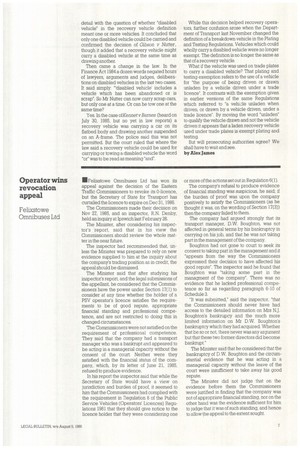Operator wins revocation appeal
Page 53

If you've noticed an error in this article please click here to report it so we can fix it.
Felixstowe Omnibuses Ltd
"Felixstowe Omnibuses Ltd has won its appeal against the decision of the Eastern Traffic Commissioners to revoke its 0-licence, but the Secretary of State for Transport has curtailed the licence to expire on Dec 31, 1986, The Commissioners made their decision on Nov 27, 1985, and an inspector, R.N. Denby, held an inquiry at Ipswich last February 26.
The Minister, after considering his inspector's report, said that in his view the Commissioners should review the whole matter in the near future.
The inspector had recommended that, unless the Minister was prepared to rely on new evidence supplied to him at the inquiry about the company's trading position as in credit, the appeal should be dismissed.
The Minister said that after studying his inspector's report, and the legal submissions of the appellant, he considered that the Commissioners have the power under Section 17(1) to consider at any time whether the holder of a PSV operator's licence satisfies the requirements to be of good repute, appropriate financial standing and professional competence, and are not restricted to doing this in changed circumstances.
The Commissioners were not satisfied on the requirement of professional competence. They said that the company had a transport manager who was a bankrupt and appeared to be acting in a managerial capacity without the consent of the court. Neither were they satisfied with the financial status of the company, which, by its letter of June 21, 1985, refused to produce evidence.
In his report the inspector said that while the Secretary of State would have a view on jurisdiction and burden of proof, it seemed to him that the Commissioners had complied with the requirement in Regulation 6 of the Public Service Vehicles (Operators' Licences) Regulations 1981 that they should give notice to the licence holder that they were considering one or more of the actions set out in Regulation 6(1).
The company's refusal to produce evidence of financial standing was suspicious, he said; if the burden of proof was upon the company positively to satisfy the Commissioners (as he thought it was, on the wording of Section 17(3)) then the company failed to them.
The company had argued strongly that its transport manager, D.W. Boughton, was not affected in general terms by his bankruptcy in carrying on his job, and that he was not taking part in the management of the company.
Boughton had not gone to court to seek its consent to taking part in the management and it "appears from the way the Commissioners expressed their decision to have affected his good repute". The inspector said he found that Boughton was "taking some part in the managment of the company". There was no evidence that he lacked professional competence so far as regarding paragraph 6-10 of Schedule 3.
"It was submitted," said the inspector, 'that the Commissioners should never have had access to the detailed information on Mrs N.J. Boughton's bankrupcy and the much more limited information on Mr D.W, Boughton's bankruptcy which they had acquired. Whether that be so or not, there never was any argument but that these two former directors did become bankrupt."
The Munster said that he considered that the bankruptcy of D. W. Boughton and the circum stantial evidence that he was acting in a managerial capacity without the leave of the court were insufficient to take away his good repute.
The Minister did not judge that on the evidence before them the Commissioners were justified in finding that the company was not of appropriate financial standing, nor on the other hand was the evidence sufficient for him to judge that it was of such standing, and hence to allow the appeal to the extent sought.




































































































